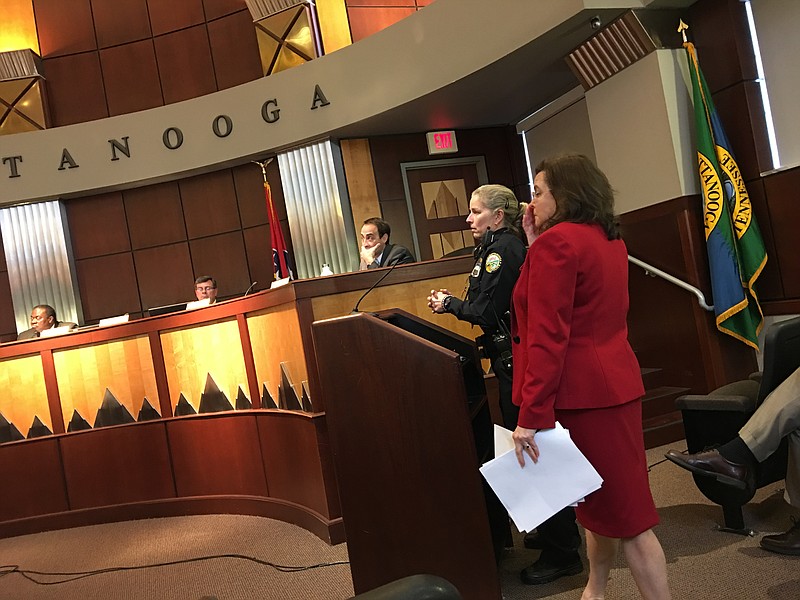The Chattanooga City Council approved $750,000 in cameras, software and video networking tools for the police department's Real-Time Intelligence Center on Tuesday.
The council also previewed tax break plans for a $17 million affordable housing development on Highway 58 and proposed changes to the city's form-based zoning rules for downtown. At the request of the mayor's office, members delayed a planned vote on a $6 million settlement with GE Power involving a failed tax break agreement with the former Alstom manufacturing operation on Riverfront Parkway.
The council voted 8-0 for police technology items, including a $137,905 contract for 15 pole-mounted cameras and networking software and a $250,000 agreement to install a video monitor wall at the police department's Real-Time Intelligence Center.
"Thank you for the tremendous amount of support you are showing our police department," Assistant Police Chief Danna Vaughn said. "I've been here over 20 years, and this is probably the most exciting thing in my career to watch the technology come forward like you guys are allowing it to proceed."
Other police intelligence-gathering purchases include a $316,095 contract for data management services and face-matching software. That contract requires a $29,656 annual maintenance and support agreement. The council also approved a $40,000 mobile app that allows the police department to push notifications to citizens and for citizens to report criminal activity in a real-time environment.
"We all feel excited about what is happening to our police department with not only the technology, but the personnel," council Chairman Moses Freeman said, citing the department's professionalism.
Councilman Chris Anderson announced the body would vote next week on a 15-year payment-in-lieu-of-taxes agreement with Nashville-based Trent Development Group, which proposes to build and manage the Flats at Fifty-Eight, a 120-unit apartment complex to be located at 5921 Highway 58.
Developer Alex Trent said there is no way his company could offer affordable housing without the agreement, which calls for the developer to not pay property taxes based on improvements it makes to the site for the first 10 years of the agreement. The developer would ramp up to paying the full tax bill in 20 percent increments over the next five years.
In return, the developer will restrict all units, a mix of two- and three-bedroom apartments, to tenants earning 60 percent or less of the area's average median income.
That amounts to a $36,720 annual salary for a family of four in Hamilton County, according to 2016 Housing and Urban Development figures.
Complex amenities include a saltwater pool, a shelter for school bus riders, outdoor event space and a learning center.
Karen Hundt, director of community planning and design for the Regional Planning Agency, said the city's planning commission would vote in March on a number of revisions to Chattanooga's form-based code, which focuses on appearance, streetscapes, pedestrians and motorists as opposed to residential, commercial or industrial uses. The changes will come before the council in April, she said.
Recent public meetings drew the agency's attention to a number of parking-related issues, including a call for requiring more parking spaces to support student housing, which often has three or more tenants per unit, she said.
Anderson said he had heard complaints the city's code was more restrictive on parking lot design by requiring one tree for every five parking spaces.
Hundt said the matter was under review, considering some cities required only one tree for every 10 spaces, but others went as low as one tree for every seven parking spaces.
The agency also plans to look at allowing existing facilities, such as the Tennessee Aquarium or Finley Stadium, to incorporate restaurants in their operations.
Contact staff writer Paul Leach at 423-757-6481 or pleach@times freepress.com. Follow him on Twitter @pleach_tfp.

